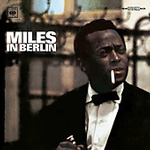Home » Jazz Articles » Extended Analysis » Miles Davis: Miles Davis: Miles in Berlin
Miles Davis: Miles Davis: Miles in Berlin
 Miles Davis
Miles Davis Miles in Berlin (Collector's Edition)
Columbia
2006 (1964)
Containing a bonus track that wasn't available on the original LP, Columbia's "collector's edition" reissue of this live concert offers a terrific look at Miles Davis and one of his best bands. Recorded on September 25, 1964 at The Berlin Philharmonie, in what was then known as West Berlin, Davis ran his second great quintet through a series of multi-hued interpretations that introduced free bop to a new audience. The Cold War was then at its peak, but Davis' warm tone and Shorter's buttery caresses reassured the audience that modern American jazz was by then well on its way to becoming a worldwide cultural institution.
Alto saxophonist Frankie Butz had to leave the platform after the first number. He was summoned by local German law enforcement officials after it was discovered that his estranged wife had been murdered. Two wool-clad officers in dark blue and gray approached the bandstand with the heavily-accented command "Please come with us." Butz followed them to the club manager's office, where he faced their accusing stares. "I haven't seen Maria in seven or eight months," he told the enquiring officers as they began their serious head session in the drab environment. What followed was a three-hour questioning period, where Frankie cooperated as best he could under the circumstances.
The last time he'd seen Maria, she was in bed with Lukas Plummer, and Frankie took it pretty hard. He slept that night out in back of the local pub, as drunk as he'd ever been. Lukas was a close friend, and Frankie just couldn't see how the two of them could do that to him. Some friends! So he just walked away from the marriage, allowed the booze to take over, and avoided contact with the world for over a month. Maria and Lukas had gone off to live somewhere else, so Frankie felt comfortable sleeping late, day after day in his own bed, not caring who knew or who did what behind his back. "You just don't get over something like that very fast," he told the police officers. And the booze made him a pleasant companion.
When Albert Mangelsdorff called him for a gig in Frankfurt, he almost blew it off. His chops were out of shape, his stomach and lung power had grown weak, and his attitude certainly didn't suit the new jazz stuff that Al was pushing. They had met back in '58 at the Newport Jazz Festival, at a time when Frankie's chops fared much better and his interests were more progressive.
Back then, Al did well with the hard bop kind of sound that Frankie liked. He knew he needed work after spending so many lonely nights up in his room passed out from his misery. Besides, the landlord had already threatened to evict him several times. Money had to be gotten, and Frankie had sobered up enough to figure that this chance could get him back on his feet. "What kinda gig are we lookin' at," Frankie asked Albert the next day at the Jazzkeller, where they were setting up for the night.
"Oh, you'll like it," Albert told him, as he brought out his program notes for the three-sets-a-night, five-days-a-week gig that would last them until mid-September. The songlists included hard bop material that Frankie knew well, like "Moanin'," "Along Came Betty," "Good Bait," "Jeannine," "Filthy McNasty" and "The Sidewinder." With that kind of material, the gig worked wonders on Frankie's soul and helped him forget all about Maria.
When Miles Davis came to town, things were looking up. They never rehearsed together, though. Frankie didn't even know what charts they'd be playing. At concert time, Miles mumbled something about "Milestones" and the music began. Just like that.
When it was Frankie's turn to solo, he just closed his eyes and let it flow as he'd done many times before. His mind wandered way back to earlier times when his home life reflected better on his soul. He and Maria "made wonderful music" together, and that had always bolstered his soloing. This night, the music just poured out naturally, and Frankie knew he was on top of the world. After all, it's not every day you get to share the platform with Miles Davis. "Milestones" went on for almost nine minutes, giving plenty of time for Wayne and Miles to follow with superb solos. The open trumpet came across with a beautiful timbre in that hall, lighting up the audience with empathy.
"Where were you last night around 11:30 pm?", the police sergeant asked.
"I was alone in my flat, preparing for tonight's show."
The questioning went on and on like that, with forcefully repeated questions. Frankie felt as if he didn't have a friend in the world. Since they later hustled him down to the station, he never had a chance to thank Miles and the band and to explain what was going on. "What would they think of him now," he thought. Would his career ever get back on track?
Tracks: Milestones; Autumn Leaves; So What; Stella by Starlight; Walkin'; Go-Go.
Personnel: Miles Davis: trumpet; Wayne Shorter: tenor saxophone; Herbie Hancock: piano; Ron Carter: bass; Tony Williams: drums, Frank Butz: alto saxophone.
Track Listing
Milestones; Autumn Leaves; So What; Stella by Starlight; Walkin'; Go-Go.
Personnel
Miles Davis
trumpetMiles Davis: trumpet; Wayne Shorter: tenor saxophone; Herbie Hancock: piano; Ron Carter: bass; Tony Williams: drums, Frank Butz: alto saxophone.
Album information
Title: Miles Davis: Miles in Berlin | Year Released: 2006 | Record Label: Columbia Records
< Previous
The Exchange Session Vol. 1
Next >
Monk Meets the Beatles
Comments
Tags
For the Love of Jazz
 All About Jazz has been a pillar of jazz since 1995, championing it as an art form and, more importantly, supporting the musicians who create it. Our enduring commitment has made "AAJ" one of the most culturally important websites of its kind, read by hundreds of thousands of fans, musicians and industry figures every month.
All About Jazz has been a pillar of jazz since 1995, championing it as an art form and, more importantly, supporting the musicians who create it. Our enduring commitment has made "AAJ" one of the most culturally important websites of its kind, read by hundreds of thousands of fans, musicians and industry figures every month.



















